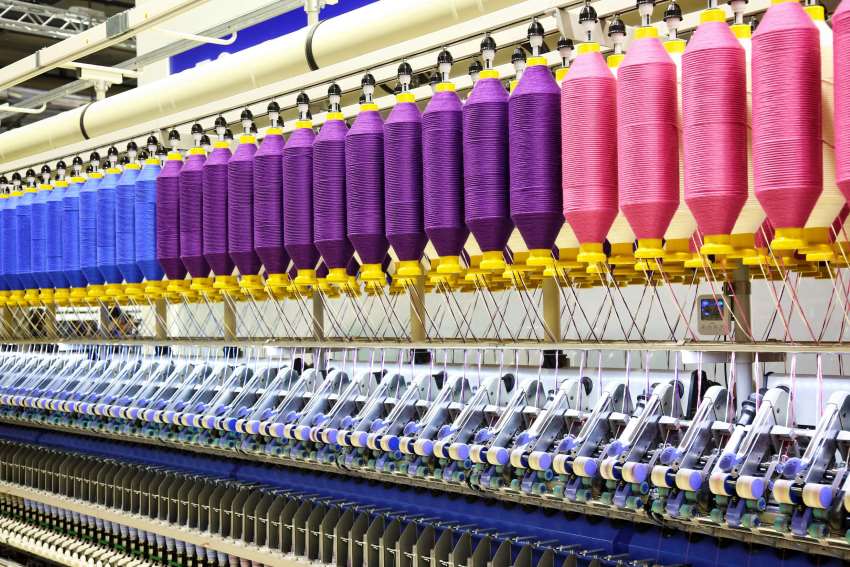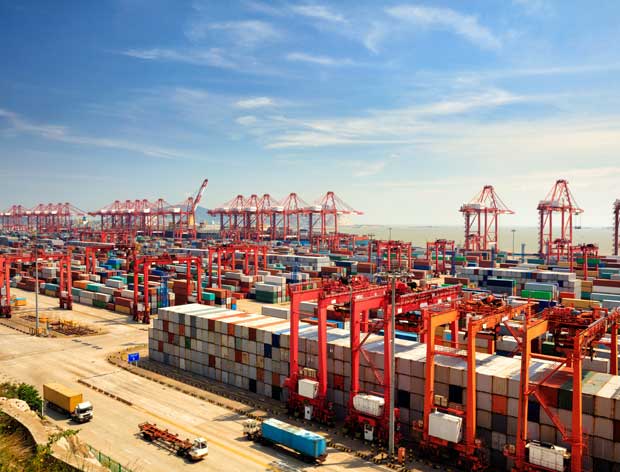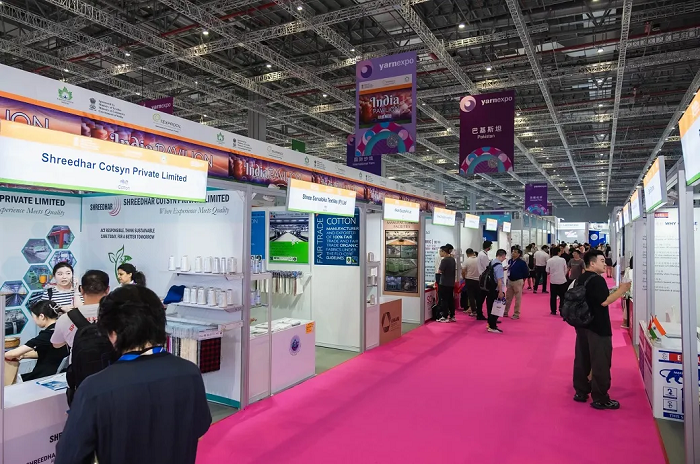The world’s largest textile trade fair, InterTextile, has begun in Shanghai, hosting over 4,000 exhibitors—a record number for the event. This year’s show highlights China's ongoing prominence in the global textile industry, showcasing the latest innovations and trends.
A key highlight is Prutex, an A-share listed Chinese textile manufacturer, introducing its innovative chemical recycling process for nylon. This technology, the first of its kind in China, avoids the yellowing associated with physical recycling methods and allows nylon to be recycled multiple times. Prutex's innovation is set to produce 20,000 tons annually, reflecting the industry's shift towards sustainable practices.
Kevin Shen, Executive Vice President of Prutex Nylon, highlighted that while Southeast Asia draws in labor-intensive, lower-stream sectors, China’s textile industry continues to excel in the middle and upper streams. The majority of Prutex's clients, both domestic and international apparel brands, seek advanced raw materials, reflecting China's competitive edge in higher-value manufacturing.
China’s textile sector, which peaked in 2014, has since transitioned from lower-stream production to more sophisticated, value-added manufacturing. The presence of 1,000 foreign exhibitors at InterTextile 2024 underscores China's role not only as a manufacturing hub but also as a global trading center for textiles.
Despite rising labor and raw material costs, China's textile exports saw a modest 1.5 per cent growth in the first half of the year, signaling the sector's enduring competitiveness.
To help transform the industry, Uzbekistan aims to double textile exports to $6.5 billion by 2026.
AbdulazizAbudrakhimov, Press Secretary, Uztekstilprom, says, the country aims to expand into new markets with deeper integration into global supply chains. To achieve this, it plans to enter into new collaborations with international organisations like the International Textiles Manufacturers Federation (ITMF) and the International Apparel Federation (IAF).
Foreign investment would be a significant driver of this growth, with international companies setting up factories across the country. An Italian brand has launched a factory in Kashkadarya, and two German companies have commenced operations, boosting production and export capacity. To secure new markets, Uzbekistan continues to send regular business missions to countries like China and various European nations.
From $3.5 billion in 2023, Uzbekistan plans to double its textile exports by 2026 increasing their volume and shifting toward higher-value products. The country also plans to focus on exporting fabrics and ready-made garments, such as t-shirts, trousers, and jeans, which are gaining popularity in Europe.
Historically known for high-quality cotton, Uzbekistan is reducing reliance on raw cotton exports in favor of finished products like fabrics and garments. This helps add value and increase revenue.
In September 2024, Samarkand will host the ITMF Annual Conference & IAF World Fashion Convention, a major event expected to attract over 500 industry professionals. The conference will address critical industry issues such as AI, production digitalisation, sustainable development, and supply chain optimisation, further solidifying Uzbekistan’s role in the global textile industry.
Marking a significant shift in consumer preferences, Asics has emerged as a leading brand in the sneaker resale market. As per a report by online trading marketplace StockX, with demand for major labels like Nike on a decline, challenger brands such as Yeezy and Fear of God are reshaping the secondhand sneaker landscape, with Asics standing out as a key player.
Asics' resurgence can be attributed to several factors, particularly its strategic collaborations and the enduring appeal of its classic models. A notable collaboration fuelling Asics' success is the JJJJound x Asics Gel-Kayano 14, released in 2022. Along with other popular releases, this partnership has helped position Asics as a sought-after brand in the resale market.
Asics' classic models, such as the Gel-1130 and Gel-Kayano 14, continue to drive the brand's popularity, highlights StockX, Additionally, the brand’s newer releases like the Gel-NYC and GT-2160 have also garnered significant attention, further solidifying its position in the market.
Scott Cutler, CEO, StockX, notes, driven by shifting consumer preferences and innovations from challenger brands, the sneaker market is undergoing significant changes. The inspiration and innovation coming from these brands are shifting market share and consumer preferences away from traditional leaders, he adds.
The streetwear market is also experiencing notable shifts, with legacy brands such as Supreme and BAPE reporting declines of 3 percent and 7 percent, respectively. In contrast, Fear of God has experienced an 18 percent rise, reflecting the brand's growing influence and appeal within the streetwear community.
The 9th Canadian Clothing and Textile Purchasing Exhibition (ATSC) kicked off on August 26 at the Toronto International Centre. Organized by the China Chamber of Commerce for Import and Export of Textiles (CCCT) and Jiangsu Trade Promotion International Conference & Exhibition Co., Ltd. (JSICE), with support from the Canadian Apparel Federation (CAF) and JPC from the US, the event attracted exhibitors from over 10 countries, including China, Pakistan, and Canada.
With more than 200 booths spread across 3,000 square meters, the exhibition saw over 120 Chinese exhibitors showcasing a diverse range of products, from clothing and home textiles to bags and shoes. Notable Chinese brands like Peak, Aparso, and Mizuda were featured as part of a special promotion supported by China's Ministry of Commerce, highlighting their quality and expanding their international presence.
The first day of the exhibition drew around 800 visitors, with total attendance expected to surpass 2,000 over the three-day event. The exhibition also hosted over 20 forums, where industry experts from Europe and the US discussed key topics such as global procurement trends, supply chain security, and sustainable development.
A follow-up trade fair is scheduled in Montreal on August 30, featuring 70 companies, further emphasizing ATSC's role as Canada's leading international textile and clothing procurement event.
Two of the must-attend wholesale events by MMGNET Group for the East Coast market, Magic New York and Sourcing at Magic New York will reunite the fashion community at the Javits Center from Sep 22-24, 2024. Offering a premier opportunity to see the latest styles in person, the events also aim to foster connections in the US fashion industry.
Over 300 established and emerging designers across apparel, footwear, accessories, home, gift, and beauty categories will showcase their upcoming collections at Magic New York. Featuring a diverse lineup of top brands, including Tribal, Barefoot Dreams, Katy Perry Collection, FRNCH, and jewelry brand Little Words Project, the event will offer brands, buyers, media, and fashion influencers a first look at the latest trends and collections.
One of the key hightlights of the event will be newcomers to the Magic show floor, such as Vera Bradley, Six Fifty Clothing, and I Love Tyler Madison. Retailers like Revolve, Shopbop, and Bloomingdale’s will also participate in the event to preview the upcoming apparel, accessories, footwear, home, gift, and beauty collections.
Dedicated to supporting emerging brands and boutiques, Magic New York will host educational sessions, including a panel with the creative futures agency Fashion Snoops. This panel will explore retail strategies and trends defining Spring/Summer 2025 in women’s young contemporary fashion.
Running alongside Magic New York, Sourcing at Magic New York will focus on supply chain efficiency, small batch orders, and speed to market. This event offers wholesale brands and retail buyers access to a carefully curated selection of fashion manufacturers, suppliers, service providers, technology, and sustainable solutions. Over 100 exhibitors from more than 14 countries, including Peru, Vietnam, Portugal, Turkey, and Japan, will be represented at the event.
Panel discussions at the event will cover essential topics including sustainability in product development and production processes for entrepreneurs, further emphasising its commitment to shape the future of the fashion industry, notes Andreu David, Vice President, Sourcing at Magic.
Organisers of IFKT (International Federation of Knitting Technologists) congress, a premier global event for knitting technologists, designers, enthusiasts, and industry leaders, plan to organisethe next edition of the event in Croatia. The 51st edition of the tradeshow was recently held in Ontario, Canada.
Attended by delegates from eighteen countries, the event served as a dynamic platform for the global knitting community to connect, exchange knowledge, and explore new frontiers in this timeless craft. It demonstrated the power of knitting to unite people, inspire creativity, and celebrate diverse cultural traditions from around the world, avers Hitesh Kumar Sharma, President, IFKT-North America.
Among the highlights of the event was the release of a commemorative book, celebrating 65 years of IFKT excellence, by Harkirat Singh, Deputy Mayor, Bramptonalongside IFKT board members. Additionally, JayeshMenon, Senior Advisor-Economic Development, City of Brampton, presented on B2B cross-border opportunities.
Attendees also enjoyed presentations from institutions such as Seneca Polytechnic in Toronto, HochschuleNiederrhein University of Applied Science in Germany, and Kent State University of Fashion in the US. These sessions provided insights into the latest yarns, fabrics, tools, and technologies that are shaping the future of the knitting industry.
A highlight of the event was visit of the IFKT board members from Germany, Ireland, the United States, and Bangladesh to The Great Canadian Sox Knitting Co Inc., where they witnessed the plant's operations and its collection of thermal woollen socks.
eVent Fabrics, a leader in waterproof and breathable technologies, is advancing sustainability with the launch of eVent Bio and alpineST, both of which are free from PFAS chemicals. These innovations align with new regulations in the European Union and several US states, which are phasing out PFAS due to environmental concerns.
Chad Kelly, President of eVent Fabrics, emphasized that the company views sustainability as an ongoing journey, with a focus on providing the most sustainable options available while ensuring that performance standards remain high. He noted that eVent Bio and alpineST successfully meet these goals without compromising on quality.
eVent Bio utilizes a bio-based membrane made from renewable plant-based and biomass materials. It provides all-weather protection with a reduced carbon footprint and is recyclable at the end of its lifecycle. The technology incorporates recycled face and backer fabrics, ensuring durability and flexibility.
alpineST offers an eco-friendly alternative to ePTFE, featuring a fluorine-free membrane and recycled face fabrics. Designed for extreme conditions, it boasts an initial waterproof rating of 25K, maintaining 20K after multiple washes.
eVent Fabrics' full range of PFAS-free laminates supports apparel, footwear, and accessories, meeting global recycling standards while delivering trusted performance in the most demanding environments.
At the recent Australian Cotton Conference, TaslimulHoque, Director - Operations, Square Textiles, outlined the company's commitment to integrate more sustainable practices within the cotton supply chain.
Co-hosted by the Australian Cotton Shippers Association and the International Cotton Association Ltd Women in Cotton committee, the event gathered industry leaders to address the growing demand for data transparency throughout the cotton value chain.
Key discussions at the event focused on the forthcoming European Union legislation for resource efficiency, biodiversity restoration, and pollution reduction. Panelists, including representatives from IKEA, Agri Direct Australia, and various Australian cotton stakeholders, examined the challenges and opportunities posed by these regulations.
Eimear McDonagh, Director, Agri Direct Australia Pty, emphasised on the importance of industry-wide collaboration to ensure the implementation of the EU Green Deal leads to positive outcomes without unintended consequences. The panel also stressed on the need to highlight the benefits of cotton and other natural fibers, both in Australia and globally, to support a sustainable future for the textile industry.
Canberra-based company, Samsara Eco plans to construct a textile-to-textile recycled nylon 6.6 polymer production facility in Southeast Asia in collaboration with Israel-headquartered polyamide manufacturer Nilit.
This initiative is designed to tackle the challenge of recycling nylon 6.6, a widely used but notoriously difficult-to-recycle fiber in the performance apparel and fashion industries, especially when blended with other fibers like spandex.
Samsara Eco has developed a patented enzymatic recycling technology called EosEco that breaks down plastics into their core molecules, which can be used to create new plastics. The technology can process a variety of feedstock inputs, including colored and blended textiles like nylon 6.6 with spandex.
Founded in 2020 in partnership with the Australian National University (ANU) and supported by Main Sequence and Woolworths Group, Samsara Eco has raised over A$160 million from local and global investors, including Breakthrough Victoria, DCVC, Hitachi, lululemon, Temasek, Wildcard Ventures, and Wollemi Capital.
Approximately 4 million tons of nylon 6.6 is produced annually, making it a key fiber in the textile industry. However, its recycling has been a significant challenge. Expected to be operational by late 2026, this new plant will focus on recycling textile waste to produce high-quality recycled nylon 6.6 polymers. These polymers can be seamlessly integrated into existing supply chains for the creation of new textile fabrics.
Paul Riley, CEO and Founder, Samsara Eco, says, discarded clothing made from nylon 6.6, such as activewear and car interiors, often ends up in landfills or is incinerated, which is harmful to the planet. By partnering with Nilit, Samsara Eco can reverse this trend and give these materials new life.
IlanMelamed, General Manager, Nilit, adds,this initiative aims to provide the apparel market with premium nylon 6.6 products that have a lower environmental impact. Implementing textile-to-textile recycling solutions will significantly reduce global carbon emissions and the 92 million tons of textile waste added to landfills annually.”
Nilit plans to incorporate EosEco yarn into its Sensil portfolio, further advancing its commitment to sustainable textile production.
Bangladesh is being compelled to forgo $5 billion in annual export revenue due to the absence of a comprehensive policy framework to promote the recycling of post-industrial textile waste, known as jhut, says a new study conducted jointly by GesellschaftfürInternationaleZusammenarbeit (GIZ) GmbH and H&M.
Titled ‘Regulatory Framework to Enable Recycling of Post-Industrial Waste (Jhut) for the RMG Industry in Bangladesh’ the study emphasiseson the need to formalise the jhut sector to unlock the textile industry's potential for innovation and growth through a circular economy.
Currently, limited to 18,000-24,000 tons annually,Bangladesh's recycling capacity for apparel-grade yarns represents only 5-7 percent of the 330,000 to 500,000 tons of cotton and cotton-elastane waste produced each year. Of this, less than 5 percent is upcycled into products like rag rugs, rag dolls, and blankets. Over 55 percent is exported to global recycling companies, while the remainder is downcycled into stuffing materials, incinerated for energy recovery, or sent to landfills.
To address this issues, the study emphasies on the need to establish an effective jhut management framework that maximises economic, social, and environmental benefits. Key recommendations by the study include fostering collaborative stakeholder engagement, protecting workers' rights, promoting circular textile practices, and enhancing capacity and technology in the jhut sector. The study also suggests policy measures for the informal jhut sector, such as improving data transparency through a national jhut database, introducing industry guidelines for jhut management, and revising tax and tariff rules related to jhut transactions.
Additionally, the report proposes setting up central depository systems and cluster-based sorting hubs to encourage decent work and social inclusion, as well as improving the investment environment for advanced recycling technologies. The current disposal methods, which include incineration and downcycling, pose significant environmental risks, such as air pollution and resource depletion.
Lastly, the study highlights the global shift towards sustainability in the textile sector, driven by major brands like H&M and stricter regulations from bodies like the European Union. This trend presents an opportunity for Bangladesh to enhance trade through sustainability goals, formalise the jhut sector, and adopt circular economy models, thereby driving innovation and market growth for recycled textiles, it says.
- 1
- 2
- 3
- 4
- 5
- 6
- 7
- 8
- 9
- 10
Beyond the label, RepRisk flags human rights and environmental hazards in fashio…
The global apparel and textile industry, long celebrated for its role in democratizing fashion and creating jobs across continents, is... Read more
Made abroad, worn at home imports are replacing US garment production
The story of America’s clothing industry is one of contrast: booming demand from consumers but shrinking capacity at home to... Read more
Uniform GST rate ends duty anomalies, brings relief to textile manufacturers
When Finance Minister Nirmala Sitharaman rose to chair the latest GST Council meeting, few expected the sweeping changes that would... Read more
Renewables, recycling, and resilience, fashion’s blueprint for Net Zero
The mid-2025 stage is important. As the world inches toward 2030, the fashion industry finds itself at a crossroads between... Read more
Global apparel trade and retail show mixed but resilient outlook in August 2025
The global apparel trade is showing a patchwork of resilience and volatility as the latest data from the Wazir Advisor’s... Read more
Intertextile Shanghai Autumn Edition kicks off with focus on innovation and sust…
Global textile and apparel industry's most anticipated event, Intertextile Shanghai Apparel Fabrics – Autumn Edition 2025 officially opened at the... Read more
Amazon's algorithmic price-parity policies face fresh legal challenges in UK, Ge…
Amazon finds itself at the center of a new wave of legal and regulatory scrutiny in Europe, as two major... Read more
South Asia’s textile crossroads, India struggles, rivals rise amid US tariff sho…
The global trade stage has seen a reset this August with escalating US tariffs, creating a high-stakes, three-way competition for... Read more
Global supply chains scramble in 2025 as US tariffs drive frontloading and sourc…
Year 2025 has seen the global textile and apparel industry facing unprecedented volatility, largely because of the unpredictable US tariff... Read more
Yarn Expo Autumn 2025 to be the ‘Most Comprehensive Edition Yet’
Asia’s premier platform for the yarn and fiber industry, Yarn Expo Autumn will commence on September 2, 2025, at the... Read more












